The Bhagavad Gita explains love as devotion, equality, and surrender to God. Learn the hidden wisdom about love in...
Bhagavad Gita in Bengali Translation – Bringing Eternal Truths Closer to Home
Introduction: Eternal Wisdom in a Familiar Tongue
The Srimad Bhagavad Gita is one of the most profound spiritual dialogues ever spoken, a divine conversation between Lord Krishna and Arjuna on the battlefield of Kurukshetra. Composed in Sanskrit, its verses carry eternal truths about duty, life, the soul, and the path of devotion. But Sanskrit, while rich and precise, is not always accessible to all.
This is where translation becomes a sacred bridge. For Bengalis, the Bhagavad Gita in Bengali translation brings those eternal truths closer to heart and home. Reading the Gita in one’s mother tongue transforms philosophy into a personal message, making it easier to understand, relate to, and practice in everyday life.
This article explores the importance of the Gita’s Bengali translations, their impact on spiritual life, and why they serve as the perfect guide for both beginners and devotees in modern times.
1. Why Translation Matters in Spiritual Understanding
Language shapes how we experience the world. For spiritual texts, translation is not just about words—it’s about opening the door to divine wisdom.
The Bhagavad Gita in Bengali translation offers:
· Clarity: Complex Sanskrit verses become simple and understandable.
· Emotional Connection: Bengali’s natural sweetness enhances the devotional tone.
· Accessibility: Everyone, from students to elders, can engage with the teachings without needing Sanskrit scholarship.
When read in Bengali, Krishna’s voice feels familiar—like a trusted guide speaking directly in your home language.
2. Bengal’s Spiritual Heritage and the Gita
Bengal has always been a land of devotion and wisdom. From Sri Chaitanya Mahaprabhu spreading the sankirtan movement to Rabindranath Tagore weaving spirituality into literature, Bengal has nourished a deep connection with Krishna.
In this cultural context, the Srimad Bhagavad Gita in Bengali is not merely a translation—it is an extension of Bengal’s spiritual essence. The teachings align naturally with traditions of kirtans, pujas, and bhakti practices cherished in Bengali households.
3. The Original Gita in Sanskrit: A Foundation of Eternal Truths
The original Gita, composed in Sanskrit, is unparalleled in its poetic brilliance and philosophical depth. Its 700 verses touch upon:
· The nature of the soul (Atma).
· Duty and righteous action (Dharma).
· Paths of selfless action, meditation, knowledge, and devotion.
· The ultimate surrender to Krishna as the Supreme.
But while Sanskrit preserves the essence, translations ensure that the truths are not locked away from those unfamiliar with the language.
4. The Sacred Journey into Bengali
The Gita’s journey into Bengali was inevitable given Bengal’s rich spiritual culture. Devotees, saints, and scholars translated it to ensure Krishna’s wisdom touched every Bengali heart.
Over time, many authentic Bengali editions emerged, combining:
· Original Sanskrit verses.
· Bengali transliteration for pronunciation.
· Word-for-word meanings.
· Explanations and commentaries.
These translations ensure both intellectual understanding and emotional resonance.
5. Why the Bengali Translation Speaks to Both Beginners and Devotees
The Gita is not just for philosophers—it is for everyone. Bengali translations make this universal message approachable.
For Beginners:
· Removes the barrier of Sanskrit learning.
· Simplifies complex teachings for easy application.
· Provides a gentle introduction to spirituality.
For Devotees:
· Enhances bhakti through a familiar language.
· Deepens meditation and reflection on verses.
· Creates an intimate sense of Krishna’s presence in daily life.
Thus, the Bengali translation is both an entry point and a lifelong companion.
6. Core Teachings That Resonate in Bengali Translation
The Gita’s wisdom touches everyone, but in Bengali, its teachings feel especially close.
a) Karma Yoga – Do Your Duty Without Attachment
Krishna’s guidance on selfless duty finds a natural echo in Bengali culture, which values humility, sincerity, and dedication.
b) Bhakti Yoga – The Path of Devotion
Bengalis are naturally devotional, with kirtans, pujas, and festivals woven into daily life. Reading Krishna’s words on devotion in Bengali feels deeply personal.
c) Jnana Yoga – The Knowledge of the Soul
Verses about the eternal soul, when translated into Bengali’s poetic flow, become easier to internalize and remember.
d) Dhyana Yoga – The Discipline of the Mind
Teachings on meditation resonate with Bengal’s cultural love for reflection, music, and inner calm.
7. Reading the Gita in Bengali: A Unique Experience
Devotees often describe reading the Gita in Bengali as more than study—it feels like Krishna’s personal conversation. The experience is:
· Personal: Krishna speaks in your own language.
· Soothing: Philosophy feels warm and approachable.
· Transformative: Lessons penetrate heart and mind equally.
For beginners, this makes the Gita less intimidating. For devotees, it amplifies devotion and surrender.
8. ISKCON and BBT’s Role in Authentic Bengali Translations
The International Society for Krishna Consciousness (ISKCON) and the Bhaktivedanta Book Trust (BBT) have played a key role in publishing authentic Bengali editions of the Gita.
Srila Prabhupada’s Bhagavad Gita As It Is has been translated into Bengali with:
· Original Sanskrit text.
· Bengali transliteration.
· Word-for-word meanings.
· Detailed commentaries for clarity.
This ensures that readers receive the wisdom exactly as Krishna intended, while still enjoying the comfort of their mother tongue.
9. The Gita in Bengali for the Younger Generation
Modern youth often face stress, competition, and digital distractions. The Bengali Gita provides timeless wisdom in a relatable form.
· For Students: Teaches focus, discipline, and balance.
· For Young Professionals: Reduces stress by emphasizing effort over results.
· For Families: Strengthens devotion, unity, and peace at home.
By reading in Bengali, the younger generation feels that spirituality belongs naturally in their lives, not as something foreign or difficult.
10. Making the Gita a Part of Daily Life in Bengali
The Gita is most powerful when lived daily, not just read occasionally. Simple practices include:
· Reading one Bengali verse each morning.
· Keeping a copy of the Bengali Gita in the puja room.
· Reflecting on a teaching before sleep.
· Discussing verses with family during festivals or meals.
· Joining Bengali satsangs or study groups.
Through such practices, the Gita becomes not just a book but a constant companion.
11. Why the Bengali Translation is Essential in Modern Times
Today’s world is filled with noise, stress, and material competition. Without translation, the Gita’s wisdom risks being inaccessible to many.
The Bengali translation ensures that:
· Spirituality feels close, not distant.
· Teachings can be applied to everyday struggles.
· The cultural and devotional heritage of Bengal is preserved.
In essence, the Gita in Bengali keeps divine wisdom alive and relevant.
Conclusion: Eternal Truths at Home
The Bhagavad Gita in Bengali translation is not just a book—it is a sacred bridge between divine wisdom and the Bengali heart. It carries Krishna’s eternal truths into homes, families, and daily lives, making them personal and practical.
For beginners, it removes the fear of complexity. For devotees, it strengthens love and devotion. In both cases, the Bengali Gita becomes a perfect companion on the spiritual journey.
From Sanskrit to Bengali, from philosophy to daily life, the Gita’s journey is not just about language—it is about love, devotion, and eternal truth becoming as close as your mother tongue, as warm as your home, and as eternal as your soul.


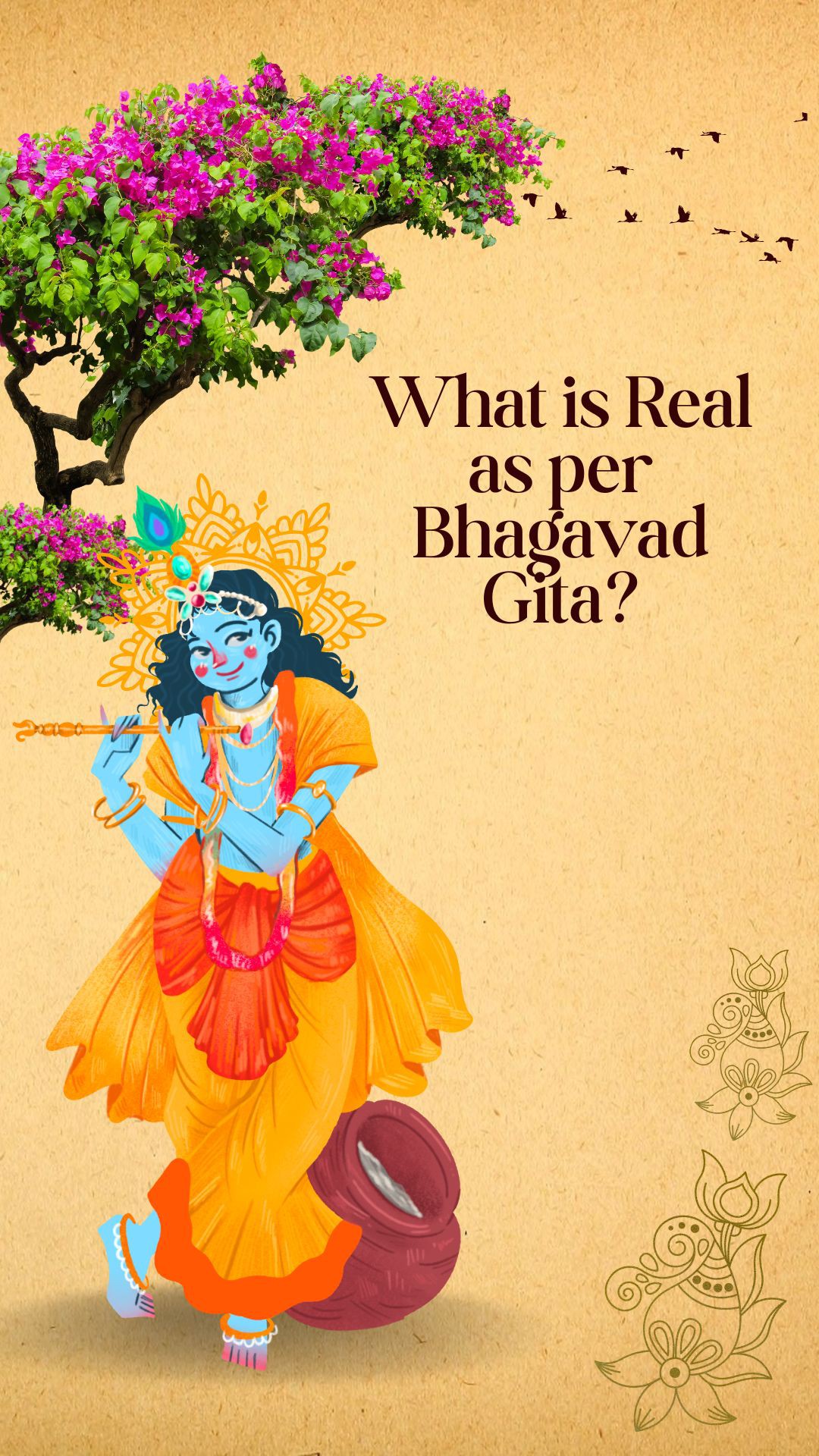
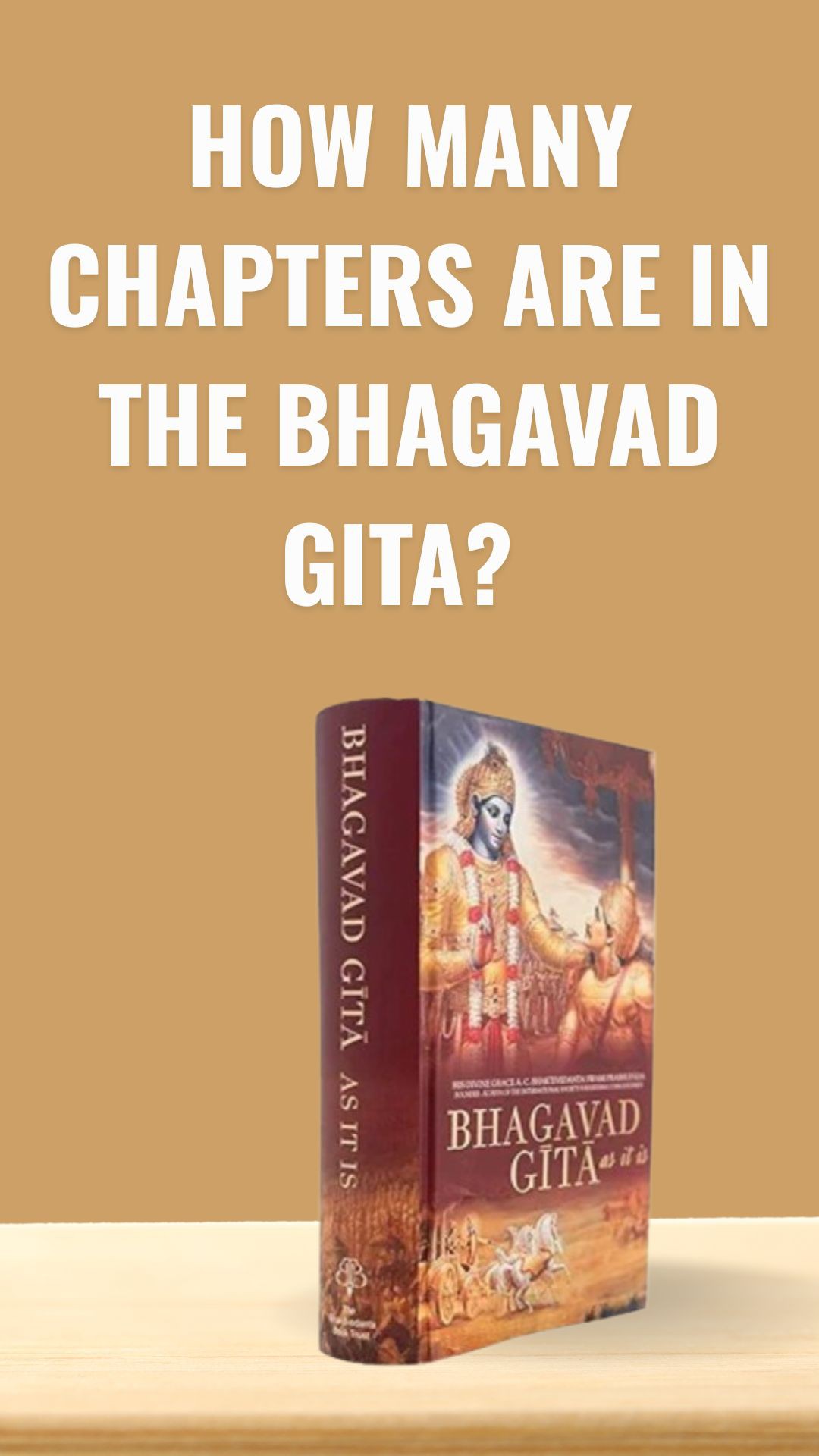




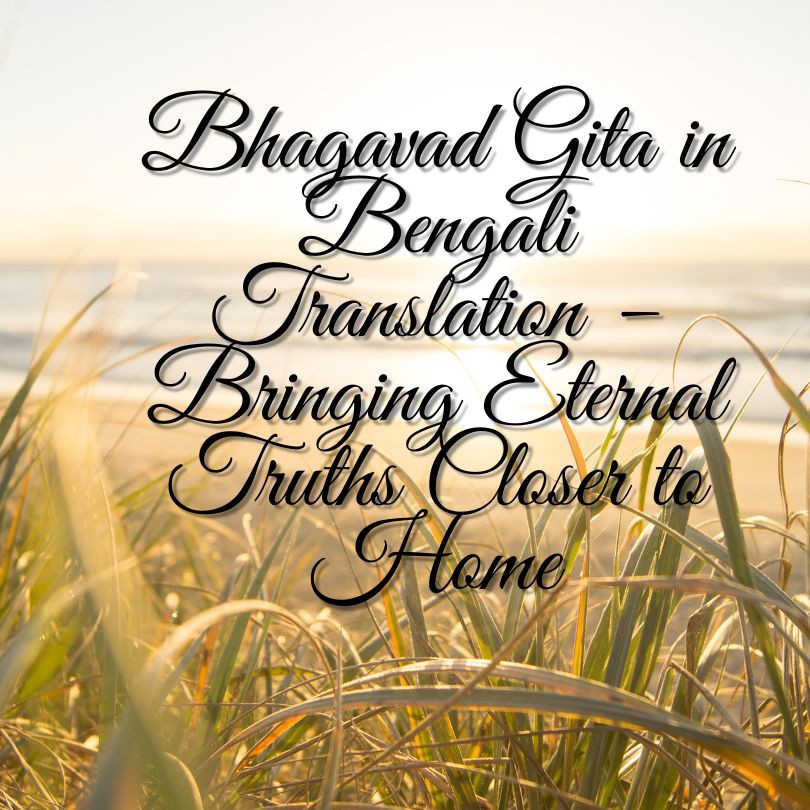
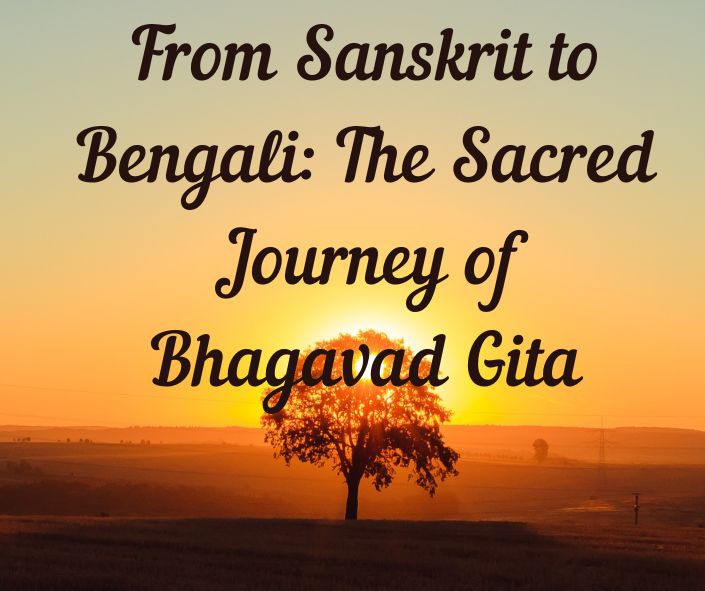

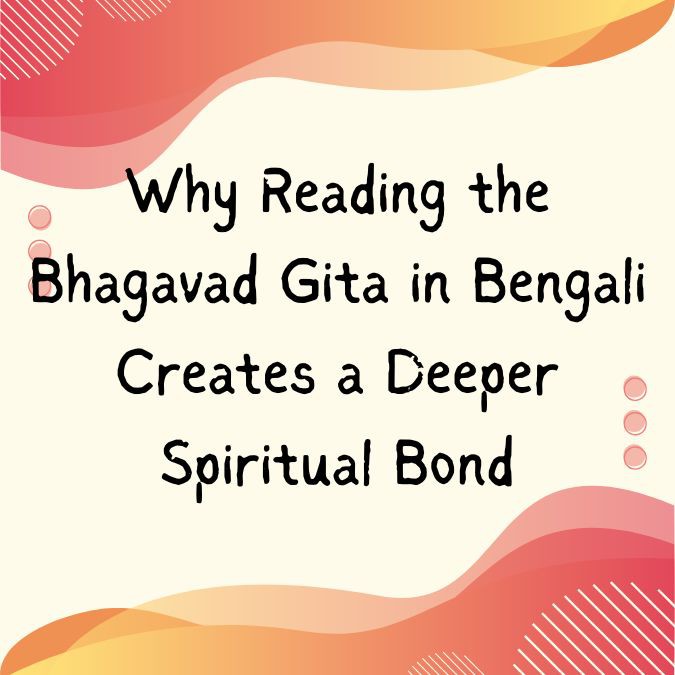
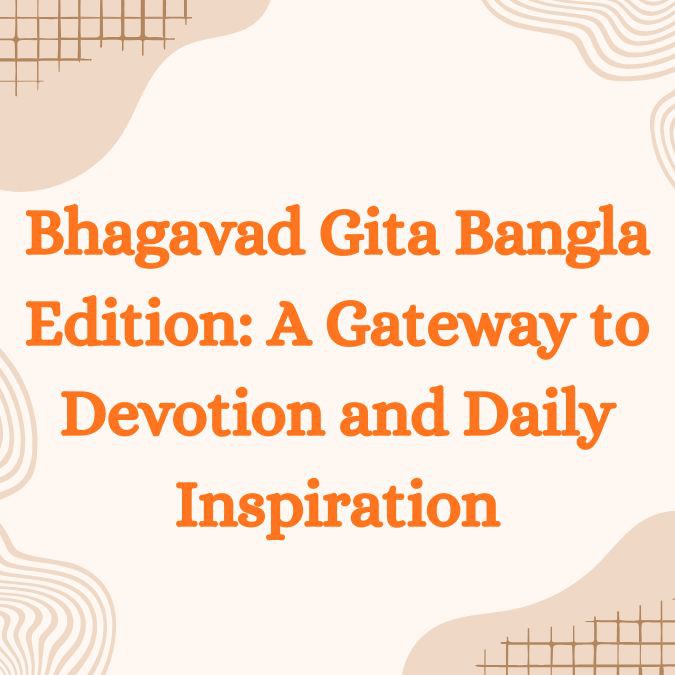


Leave a comment